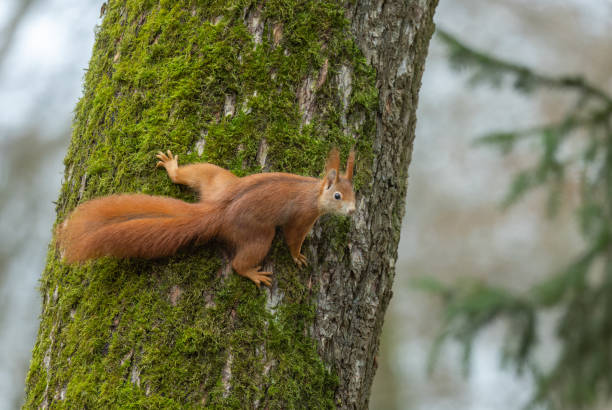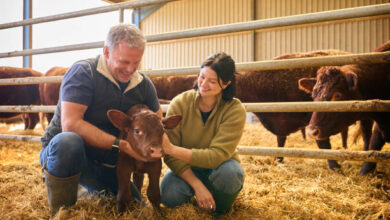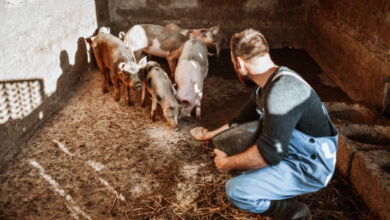
Do Squirrels Have Night Vision?
Ever wondered if the squirrels you see scampering around during the day can see in the dark? This blog post delves into the vision capabilities of squirrels, examining whether they have night vision and how it affects their behavior. By understanding the vision of squirrels, we can gain insights into their daily and nightly activities and how they adapt to their environment.
Read Also: Are Squirrels Nocturnal Animals? Their Behavior and Habits
Understanding Squirrel Vision
- The Anatomy of Squirrel Eyes
Squirrels have eyes that are specifically adapted to their arboreal lifestyle. The position of their eyes on the sides of their head gives them a wide field of view, which is essential for spotting predators and navigating through trees. Unlike nocturnal animals, squirrels do not have a tapetum lucidum—a layer of tissue in the eye that reflects light and improves night vision.
- Color Perception and Light Sensitivity
Squirrels have dichromatic vision, meaning they see a limited range of colors compared to humans. They can distinguish between some colors but not as vividly as humans can. Their eyes are more sensitive to blue and green wavelengths, which helps them detect food and predators during the day.
- Comparison with Human Vision
While humans have trichromatic vision, allowing us to see a broader spectrum of colors, squirrels rely more on motion detection and less on color differentiation. Their vision is sharp and well-suited for daylight, but not for low-light conditions.
Read Also: Diseases of Farm Animals and How to Prevent Them
Behavioral Patterns of Squirrels
- When Are Squirrels Most Active?
Squirrels are primarily diurnal, meaning they are active during the day. Their activity peaks in the early morning and late afternoon. They spend their days foraging for food, building nests, and socializing with other squirrels.
- Common Activities During the Day
During daylight hours, squirrels are busy gathering nuts, seeds, and other food items. They are also known for their playful behavior, chasing each other around trees and engaging in social interactions.
- Nighttime Activities
At night, squirrels retreat to their nests or dens to sleep. Unlike nocturnal animals, they are not adapted to low-light conditions and do not venture out in the dark. Their lack of night vision makes it difficult for them to navigate and find food after sunset.
Read Also: What Animal Eats Snakes? Unveiling Nature’s Predators
Do Squirrels Have Night Vision?
- Examining the Evidence
Scientific studies on squirrel vision indicate that squirrels do not have the adaptations necessary for night vision. Their eyes lack the tapetum lucidum, a reflective layer that enhances vision in low-light conditions. Instead, squirrels rely on their keen sense of smell and hearing to detect predators and navigate their environment.
- Adaptations for Low Light
While squirrels do not have true night vision, they can see in low-light conditions to some extent. Their large eyes allow them to gather more light than smaller-eyed animals, giving them some ability to see in dim conditions. However, this is not comparable to the night vision of nocturnal animals like owls or cats.
- Comparison with Nocturnal Animals
Nocturnal animals, such as owls and cats, have specialized adaptations for seeing in the dark, including a higher number of rod cells in their retinas and the presence of a tapetum lucidum. Squirrels, being diurnal, lack these features and are not equipped for nighttime activity.
Factors Affecting Squirrel Vision
Environmental and Biological Influences
- Impact of Light Pollution
Urban environments with artificial lighting can affect squirrel behavior and vision. While light pollution doesn’t give squirrels night vision, it can extend their active hours slightly by providing extra light for them to see.
- Seasonal Changes
Seasonal changes and varying daylight hours influence squirrel activity. During shorter winter days, squirrels may adjust their foraging times but still remain active primarily during daylight.
- Age and Health
The age and health of a squirrel can affect its vision. Younger, healthier squirrels tend to have better eyesight, while older squirrels may experience diminished vision.
Read Also: What Animal Has the Best Sense of Smell?
Myths and Misconceptions
Common Beliefs About Squirrel Vision
- Debunking Myths
One common myth is that squirrels have excellent night vision. This is not true; their vision is adapted for daylight, and they lack the necessary eye structures for effective night vision.
- Factual Information
Providing factual information helps clarify these misconceptions. Squirrels are not nocturnal and do not have the same night vision capabilities as animals adapted to life in the dark.
- Popular Culture and Squirrel Vision
Popular culture sometimes portrays squirrels inaccurately regarding their vision abilities. Understanding the true nature of squirrel vision helps dispel these myths.
Conclusion
It’s clear that squirrels do not have night vision. Their vision is adapted for daylight activity, and they rely on other senses, like smell and hearing, to navigate and detect predators. Understanding these aspects of squirrel behavior can help us appreciate their adaptability and the fascinating ways they interact with their environment.
Have you observed squirrel behavior during different times of the day? Share your experiences and observations in the comments below!




